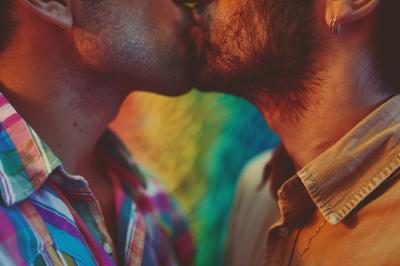On this page
Gay is a word that has become so ubiquitous in the English language: it’s hard to imagine what life would be like if we didn’t have it. But what are some other words you could use to describe someone who is gay?
Well, today it’s time to find out, as we take a look at some other words for gay! But please be cautious; this list also contains some words that are considered offensive, so you know which ones to avoid!
What does gay mean?

Before we can delve into finding other words for gay, we need to first ask: what does the word “gay” actually mean? Today, we use the term primarily to describe one of the following:
- a person who is sexually or romantically attracted to people of the same gender: “His brother is gay.”
- something that is related, of, or used by gay people: “That’s a gay bar.”
A thing to note is that even though the term “gay” is used for men and women alike, it’s more often used for men than for women. For women, the term “lesbian” also suffices, which does not work for men, though.
And maybe you have already heard of it, but believe it or not, the word gay actually used to mean something very different! Before gay became a sexual orientation, it simply meant happy and carefree or “having or showing a merry, lively mood” or “colorfully bright”. It was only in the 20th century that gay started to be used as a synonym for “homosexual”.
Gay is also used as an umbrella term for the LGBTQIA+ community, so it can carry a lot of connotations. But with the synonyms we list today, you’ll be able to use the right word for every situation!
So, now that we know what gay means, we can start listing some synonyms!
1. Homosexual

This is probably the most direct word to use when referring to someone who is attracted to members of the same sex. It doesn’t have the negative connotations that some of the other words do, and it’s generally considered to be a neutral term.
Because if you compare it to the term gay itself, “homosexual” literally just means “of the same sex”. So if you use this word to describe someone, you are simply describing their sexual orientation and nothing more. gay, on the other hand, is nowadays often also used as a derogatory term, like “You’re so gay, dude!”
2. Lesbian

This word is very similar to gay, but it’s specifically used to describe women who are attracted to other women. It’s a bit of an outdated term, though, and it’s not as commonly used as “gay” or “homosexual”.
3. Queer

“Queer” is a relatively new term that is slowly gaining traction as a way to describe people who are not straight. It’s considered to be more inclusive than the other terms on this list because it includes people who identify as transgender, bisexual, and all other non-straight orientations.
The word “queer” used to be a negative term, but it has been reclaimed by the LGBTQIA+ community and is now often used as a positive identifier.
4. Bisexual

“Bisexuality” is when a person is attracted to both men and women. It’s often considered to be its own separate orientation, but some people also use it as a synonym for gay.
5. Transgender

“Transgender” is an umbrella term that includes anyone whose gender identity does not match the sex they were assigned at birth. So, for example, a “transgender” person could be a man who was assigned female at birth.
“Transgender” people may or may not choose to undergo hormone therapy or sex reassignment surgery to align their bodies with their gender identity.
6. Genderqueer

“Genderqueer” is a term used by people who do not identify as either male or female. They may identify as both, or they may identify as neither. This is a relatively new and unexplored identity, so there is not a lot of information out there about it.
7. Agender

“Agender” is a term used by people who do not identify with any gender. They may choose to present as male, female, or anywhere in between. This is another relatively new and unexplored identity.
8. Intersex

“Intersex” is a term used to describe someone who is born with genitals or other physical sex characteristics that do not fit the typical definitions of male or female. “Intersex” people may also have chromosomes that do not fit the typical XX/XY definition of female and male.
“Intersex” people are often lumped in with “transgender” people, but it’s important to remember that they are two separate things. Not all “transgender” people are “intersex”, and not all “intersex” people are “transgender”.
9. Pansexual

“Pansexuality” is when a person is attracted to people of any gender identity or sex. So, a “pansexual” person could be attracted to a man, woman, transgender person, etc.
It’s often considered to be a more inclusive term than “bisexuality” because it includes people who are transgender or intersex, even though “bisexuality” and “pansexuality” are two separate things.
10. Asexual

“Asexuality” is when a person does not experience sexual attraction. So, an “asexual” person may still have romantic feelings for someone, but they will not feel the urge to have sex with them.
“Asexuality” is often lumped in with celibacy, but they are two separate things. Celibacy is a choice, while “asexuality” is not. When you’re asexual, you don’t choose not to have sex. You simply don’t feel sexual attraction.
11. LGBTQIA+

This acronym stands for “Lesbian, Gay, Bisexual, Transgender, Queer/Questioning, Intersex, and Asexual/Ally”. It’s a relatively new term that is meant to be inclusive of all non-straight orientations and gender identities.
The plus sign at the end of the acronym is meant to include all other orientations and identities that are not included in the acronym itself since it’s already becoming quite long.
12. Lavender

“Lavender” is a term that is sometimes used to describe the gay community. It’s derived from the color of the gay pride flag, which has stripes of red, orange, yellow, green, blue, and purple.
The term lavender can also be used to describe things that are gay-themed or gay-friendly. For example, you might say that a particular bar is “lavender-friendly”, meaning that it’s welcoming to gay people.
13. Camp

“Camp” is a term that is used to describe something that is “effeminate” or “flamboyant”. It’s often used to describe gay men who dress and behave in a very theatrical or over-the-top manner.
The term “camp” can also be used to describe gay culture in general. For example, you might say that a particular movie is “campy”, meaning that it’s gay-themed or has a lot of gay references.
So, there you have it: 13 different words that you can use to describe someone who is gay or that are related to it. Remember, though, that some of terms are considered derogatory, so use them with caution. If in doubt, it’s always best to just stick with the word “gay” or “homosexual”.
And never assume someone’s sexual orientation. It’s better to ask first or just let it be. Not everyone wants to share that information since it’s very personal.
Must-read queer books to add to your reading list
Queerness is often left out of the mainstream conversation, but that doesn't mean it doesn't exist. If you're looking for a crash course on queer history, literature, and culture, look no further than this list of must-read queer books. From novels to memoirs to anthologies, these books will give you a much-needed education and insight on LGBTQ+ lives and experiences that are often overlooked or ignored.
- Queer Cosmos: The Astrology of Queer Identities & Relationships
- Gay Dating, your guide to finding love: The essential read for every gay man
- Beyond Monogamy: Polyamory and the Future of Polyqueer Sexualities
- Delusions of Gender: How Our Minds, Society, and Neurosexism Create Difference
- Helping Gay Men Find Love: Tips for Guys on Dating and Beginning a Healthy Relationship
